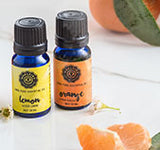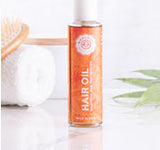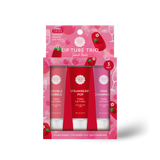Are Essential Oils Safe to Ingest?

Whether you're a long-time fan of therapeutic essential oils, or new to this world, you may be wondering if they're safe to consume internally.
Truth be told, one of the most common essential oil questions and intensely debated topics is if these oils can be ingested safely. The answer, in general, is yes. Many trained aromatherapists support internal usage for health and wellness – but only when administered correctly!
Why Consume Essential Oils Internally?
You've likely ingested essential oils many times without knowing it. The Food and Drug Administration (FDA) lists several essential oils as generally recognized as safe (GRAS) and when diluted, they're often used to flavor and preserve food and beverages.
Ingesting essential oils therapeutically also offers a powerful way to harness antioxidant, antispasmodic, antidepressant, antimicrobial, and anti-inflammatory properties. It may support the circulatory, endocrine, respiratory and immune systems.
- Research has shown ingesting peppermint essential oil is particularly useful for alleviating gastrointestinal distress.
- Roman Chamomile essential oil is dual purpose, acting as a natural sleep aid and an antispasmodic that soothes nausea and an upset stomach.
- Oregano essential oil is a potent antimicrobial and acts as a natural antibiotic.
There is certainly a time and a place for consuming essential oils. However, they are extremely potent, and that’s why it's SO important to consume them safely.
How to Ingest Essential Oils Safely
When it comes to pure essential oils, a little goes a long way! Huge amounts of flowers, peels, roots, or bark are required to make just one small bottle of highly concentrated essential oil. So, even a drop provides a powerful dose!
One of the easiest, tastiest, and safest ways to consume essential oils is in culinary use. Try using 1-2 drops to flavor meals, desserts or beverages – think homemade chocolate with a drop or two of peppermint oil or guacamole with a drop of lemon oil.
When consuming essential oils for therapeutic use, we don't advise you to dilute them with just water. Water and oil don't mix, and it may irritate your digestive tract. It's safer to consume 1-2 drops in a teaspoon of honey, syrup, or an edible carrier oil like coconut oil. Or purchase empty veggie capsules and fill with a carrier oil – coconut oil or olive oil – and a drop or two of essential oil.
Take note: quality is extremely important if you want to ingest oils as you don't want to consume any dangerous additives, solvents, or low-quality ingredients. Our Woolzies essential oils have been extracted using the purest methods and are 100% natural and therapeutic grade.
The Risks of Ingesting Essential Oils
Essential oils may be natural compounds and many of them smell good enough to eat, but this doesn't mean that they're all safe to consume and risk-free. For this reason, it's advised to consult with an experienced aromatherapist or herbalist if you're thinking of ingesting essential oils therapeutically.
For many people – like those with allergies – it may be best to stick to using the oils aromatically and topically.
Final Thoughts
Our favorite ways to use pure Woolzies essential oils are still inhalation, diffusion, and topical application. However, there's no doubt the internal application of essential oils has its place when advised by a trusted aromatherapist or healthcare practitioner. Our advice is to always start slow!
Let us know; would you consider ingesting essential oils for culinary or therapeutic use?
Suggested Posts
Tips and Tricks for Dealing with Anxiety and Panic Attacks
Racing heart? Fearful thoughts? Chest tightness? These are all hallmarks of anxiety and panic disorder. If you're struggling with debili...
Focus on: Cedarwood Essential Oil
Are you looking for a warming essential oil with a woody aroma and grounding properties? Woolzies Cedarwood Essential Oil has a beautifu...




